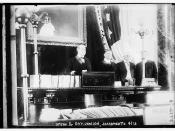Introduction The information we receive from television news media has a direct impact on our lives, whether we acknowledge it or not. As our world constantly continues to change the media information we receive changes as well. We rely on the reporters and news anchors for much more than events and happenings; we also depend on their assessment of the world that we live in. Years ago the information we received on our nightly news was simply accepted as truth and not carefully monitored or checked. Now the media is being heavily scrutinized and news organization must not only monitor their words, but how each story is presented. Does the news story give an accurate and fair account of the event? Is each story balanced with both sides given an equal opportunity to tell their stories? There must be a public understanding that local and national news directly shapes our opinions, our purchasing choices, and our lives, but we must question whether the we receive is bias or not.
There are two obvious examples of unbalanced stories in the media. The first occurred a few years ago with Jonathan Jackson, son of the Reverend Jesse Jackson. In 1994 insufficient evidence existed to charge the younger Jackson as a suspect in a drug probe. The only evidence the media had was a federal affidavit, yet the San Francisco Examiner and other news organizations reported the story. However The New York Times, The Washington Post, The Chicago Tribune, and the Chicago Sun Times did not report the story. (Gibson) A second example was the overkill by the media of the unfortunate and untimely death of John F. Kennedy Jr. Reporters jumped on every angel of the story trying to beat on another out. Here is how major newspapers covered the crash trying...

![[Portrait of Bunk Johnson and Maude Johnson, Stuyvesant Casino, New York, N.Y., ca. June 1946] (LOC)](https://s.writework.com/uploads/17/171599/portrait-bunk-johnson-and-maude-johnson-stuyvesant-casino-n-thumb.jpg)
